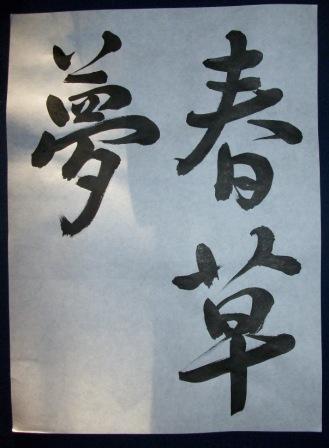Writing For Scrollmaking Class
Page 1 of 1
 Writing For Scrollmaking Class
Writing For Scrollmaking Class
 This is another writing for the Bonsai in the Bluegrass scrollmaking class, which will be held all day on June 16, 2011. This student wanted a Spring Early summer themed poem to make a scroll for their bonsai display.
This is another writing for the Bonsai in the Bluegrass scrollmaking class, which will be held all day on June 16, 2011. This student wanted a Spring Early summer themed poem to make a scroll for their bonsai display.Coming to the decision of the final poem was both difficult and arduous. However, I think this phrase conveys a beautiful sentiment for a bonsai with a spring season theme.
Although I did recommend the customer to have the work done in the Sousho style, they preferred the Gyousho.
The meaning is as follows:
A young and tender new spring grass is like a far off dream that you see as you doze off. The source for this phrase is Shuki’s 朱熹 Impromptu Poem 偶成詩 少年老い易く学成り難しwhich means, The youthful years pass quickly before one accomplishes much learning. (Source is http://www.csse.monash.edu.au) As yet we can’t remember the luxuriant beauty of the flowers in full bloom on the embankment of the pond. The meaning of this poem is hoping our dreams mature throughout life, by singing with the joy that Spring brings. On the other hand, the word Dream’s (yume) happiness reminds us that sooner or later all things have transience to them and an impermanent state. For things to change is the norm of life.
With all that however, there is a joy in dreaming and reaching for the stars. Also, we must remember that to have a dream is not only the special privilege of youth. For example, even if one does not realize the dreams they have as children, they can continue to dream as an adult to lighten a burden. Isn’t this sometimes good to have these dreams as we age?
Do not say to yourself, “I am no longer young”, and you will not limit yourself in your possibilities. We must always have and continue to have wonderful dreams throughout our lives.

Kakejiku- Member
 Similar topics
Similar topics» Writing on a Pot
» BIB Writing II
» from a kusamono class
» BONSAI PERSON OF THE YEAR 2009
» [2014]SiDiao Class
» BIB Writing II
» from a kusamono class
» BONSAI PERSON OF THE YEAR 2009
» [2014]SiDiao Class
Page 1 of 1
Permissions in this forum:
You cannot reply to topics in this forum






